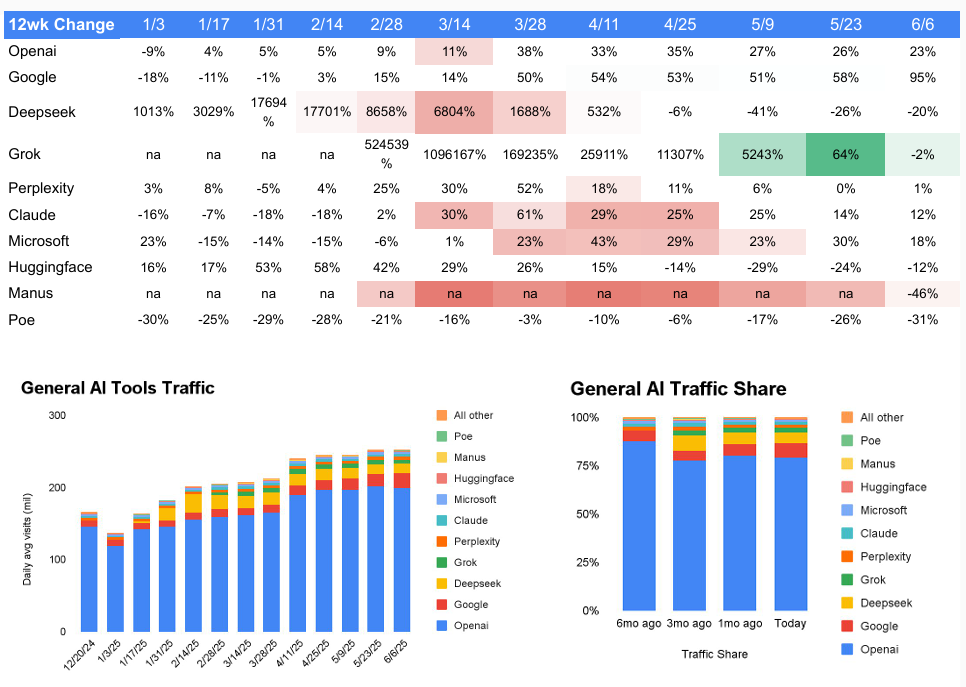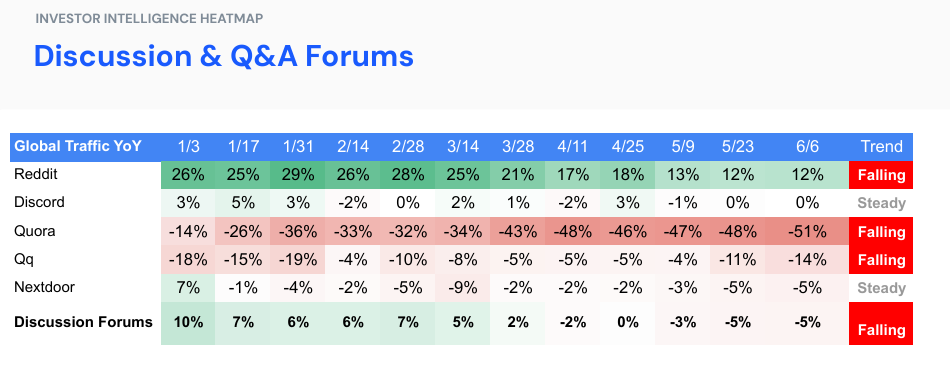The latest traffic data from Similarweb reveals an uncomfortable truth about the generative AI market: While the world debates which AI model is technically superior, ChatGPT has already won the user adoption war by a margin so vast it defies conventional competition metrics.
With 5.5 billion visits in May 2025, ChatGPT commands roughly 80% of all generative AI traffic. To grasp this scale: ChatGPT gets more visits than Google's Gemini, DeepSeek, Grok, Perplexity, and Claude combined. Then doubled. Then add another few millions for good measure.

Image: Similarweb
ChatGPT surged past 500 million weekly active users in late March, and ChatGPT's mobile app already averaged more than 250 million monthly active users between September and November 2024. OpenAI's partnership with Microsoft has certainly helped, but the scale suggests something more fundamental: ChatGPT has become the default AI assistant for hundreds of millions of users worldwide.
What's particularly interesting is ChatGPT's resilience. Despite a brief dip in traffic during early 2025, OpenAI quickly reversed the trend, surging back to new heights.
China’s DeepSeek: Neither gone nor forgotten
Another surprising data point: Chinese startup DeepSeek—banned on most U.S. government-issued devices and many institutions due to fears its feeding info to China—rocketed from 33.7 million monthly users in January to 436 million visits by May. That’s a 13x increase that would make venture capitalists weep salty tears.
Though OpenAI raised billions of dollars to accumulate as many GPUs as possible to fuel its models, DeepSeek operates at a fraction of the cost of Western models; its input tokens cost $0.55 versus OpenAI's $15. The feisty upstart achieved this while being forced to use lesser Nvidia H800 chips due to export restrictions, the computational equivalent of winning a Formula 1 race with a Toyota Corolla.

Image: ArtificialAnalysis
DeepSeek's geographic dominance tells the story: DeepSeek is building an empire in markets that Western AI companies have barely touched. The top three markets, according to Similarweb—China, India, and Indonesia—account for over 51% of its users.
The best of the rest: Google and Anthropic
For a $2 trillion company that processes 3.5 billion searches daily, Google's AI performance is pretty pedestrian. Gemini's 527.7 million visits barely edge out DeepSeek despite every conceivable advantage: billions in funding, integration across Google's ecosystem, and access to more users than any platform on Earth—plus a monopolization of the AI browser and partnerships with major brands to boost the model’s adoption.
Still, it should not be counted out: Gemini recorded 284 million visits in February, which means the model is growing in popularity—a good metric if it becomes a trend, considering its current state.
Perhaps the most unexpected finding is Claude's poor performance. Despite backing from Amazon and Google, technical superiority in many benchmarks, and constant praise from AI researchers and people in Academia, Claude attracted a bit less than 100 million visits in May 2025.
Claude had 18.9 million monthly active users worldwide as of early 2025, and while the surge is definitely a major increase in traffic, these numbers pale in comparison to ChatGPT's billions.
The disconnect between Claude's technical capabilities and user adoption is interesting. Claude 4 Opus scored better than its competition at complex reasoning and even creative tasks, yet it has failed to translate this into mass adoption, showing yet again that the best product isn’t usually the one everyone loves.
While Meta AI exists, its current usage as a primary AI tool may be considerably lower compared to ChatGPT. Many users do not currently gravitate towards Zuck’s chatbot as their preferred choice for AI-related tasks.
Meta's significant contribution to the open-source community, particularly through its Llama models, is notable. However, the nature of open-source usage is distinct from direct user interaction.
The AI-powered bloodbath
While AI companies fight for position, traditional internet businesses are watching their empires crumble. For example, Similarweb reports that Chegg's traffic collapsed 64% as students discovered ChatGPT gives better homework help for free, Quora plummeted 51%, and freelance platforms like Fiverr dropped 14%.

Image: Similarweb
On the other hand, DevOps and code completion tools surged 41% year-over-year, voice generation platforms grew 14%, and automation tools jumped 12%.
The Similarweb data delivers a brutal truth to the AI industry: technical superiority means little without user adoption. Claude may impress researchers, but ChatGPT impresses everyone else. Gemini may have Google's distribution, but distribution without differentiation is not interesting.
ChatGPT won by being first, being good enough, and most importantly, being what users actually wanted—a conversational AI that just works. While competitors focused on benchmark scores and safety protocols, ChatGPT focused on being useful. The 5.5 billion visits say that strategy worked.
So OpenAI may lose in some benchmarks, but in the race for global adoption, it has already crossed the finish line. The real competition now is for second place.
Edited by Andrew Hayward
免责声明:本文章仅代表作者个人观点,不代表本平台的立场和观点。本文章仅供信息分享,不构成对任何人的任何投资建议。用户与作者之间的任何争议,与本平台无关。如网页中刊载的文章或图片涉及侵权,请提供相关的权利证明和身份证明发送邮件到support@aicoin.com,本平台相关工作人员将会进行核查。




